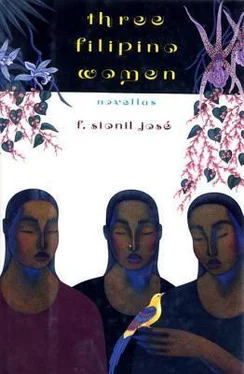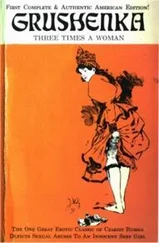Francisco Jose - Three Filipino Women
Здесь есть возможность читать онлайн «Francisco Jose - Three Filipino Women» весь текст электронной книги совершенно бесплатно (целиком полную версию без сокращений). В некоторых случаях можно слушать аудио, скачать через торрент в формате fb2 и присутствует краткое содержание. Год выпуска: 2013, ISBN: 2013, Издательство: Random House Publishing Group, Жанр: Современная проза, на английском языке. Описание произведения, (предисловие) а так же отзывы посетителей доступны на портале библиотеки ЛибКат.
- Название:Three Filipino Women
- Автор:
- Издательство:Random House Publishing Group
- Жанр:
- Год:2013
- ISBN:978-0-307-83028-9
- Рейтинг книги:4 / 5. Голосов: 1
-
Избранное:Добавить в избранное
- Отзывы:
-
Ваша оценка:
- 80
- 1
- 2
- 3
- 4
- 5
Three Filipino Women: краткое содержание, описание и аннотация
Предлагаем к чтению аннотацию, описание, краткое содержание или предисловие (зависит от того, что написал сам автор книги «Three Filipino Women»). Если вы не нашли необходимую информацию о книге — напишите в комментариях, мы постараемся отыскать её.
and
-examine the Philippine experience through the lives of three female characters, a prostitute, a student activist, and a politician.
Three Filipino Women — читать онлайн бесплатно полную книгу (весь текст) целиком
Ниже представлен текст книги, разбитый по страницам. Система сохранения места последней прочитанной страницы, позволяет с удобством читать онлайн бесплатно книгу «Three Filipino Women», без необходимости каждый раз заново искать на чём Вы остановились. Поставьте закладку, и сможете в любой момент перейти на страницу, на которой закончили чтение.
Интервал:
Закладка:
Narita participated in this discussion but all talk stopped whenever the Old Man made a point or suggested details. He had, after all, four decades of practice. He was right. We were novices and we never talked about cheating, the use of violence, intimidation, pork-barrel funds, and blackmail; these were real instruments, but we blithely ignored them.
Narita and the Old Man were peeved. I had not known how very much alike they had become in their thinking. “If it will mean victory, then cheat!” the Old Man pontificated.
“The objective is to win,” Narita said coolly. “You cannot talk morality with opponents who are immoral. You cannot tell the truth to people who will not accept that truth.”
I felt uneasy; my training was different. In that small town where I was born, my parents had pounded a little bit of honesty into me.
“You must always have options,” Narita was continuing. “That is what politics is. Always the possible …”
We were exhausted although the fruit, cake, coffee, and liquor came continuously. Saliva dripped from the corner of the Old Man’s mouth and Narita dutifully wiped it off. He was starting to doze off, and she told him to go upstairs and sleep but he said he would go home. We took him to his car and bade him good-night. The others were driven home but I stayed behind.
Alone, finally, she cuddled close as we talked, the stereo playing Chopin softly. She sighed. “I can hardly wait to put everything into motion, Eddie. I know you have reservations, but, for my sake, don’t remind me of that small house — not in the presence of others. The past is just for the two of us …”
“I did not talk about Santa Ana,” I said.
“You did, too.”
“No.”
“Want to bet?” She went to the desk at the other end of the library, fiddled with some knobs in a drawer. The music stopped and clearly, very clearly, our voices — excited and pitched — came alive. She had taped the entire discussion; the library, perhaps the whole house, was bugged.
The pre-convention plan was set. Her zarzuela was transported to Davao, Dumaguete, Bacolod, Cebu, Iloilo, and even Dagupan. It was bringing culture to the provinces. She was also invited to lecture at the universities in the South, all the way to a small college in Bongao, Sulu, and there was her thrice-a-week column that I liked to read for its freshness and unpredictability.
In the process, she was making political profiles of the provinces and checking up with the senator on the personalities she had met or wanted to meet.
She learned fast and she had a retentive memory. When the computer came at the end of the year, I wondered how necessary it really was. She had committed to memory so many things, she could have won without it.
FOUR
Ihave seen Narita in tears only once. By this time, she already had a suite in her father-in-law’s Makati building, the nerve center for her political future. She had an excellent clipping service. She had called me, I thought, about some urgent problem. When I arrived, she closed the door, told me to sit down and read an item in a weekly gossip column by Mita Guzman.
Narita never had much respect for Filipino journalists — an attitude she got from Senator Reyes who handed envelopes at the end of every month to a wide assortment of reporters. They covered the Senate and other trivia and passed themselves off as journalists. She had the long list and on it were editors, some of whom professed the highest moral motives.
Mita Guzman was a slight acquaintance; so was the husband, a small, henpecked man who was once my classmate in political science but who had dropped out to take a job as PR man for one of the congressmen. She was a woman to be feared both physically and otherwise for she had the face and the muscle of a sumo wrestler and the nastiness to skewer anything that crossed her path. Now, in her column: “She is young, pretty, and able. She has a Columbia degree and she sings well in a modern musical. Watch out for this girl now for though her father died a drunk and her mother sold meat (not rotten) in the old hometown, she has claims to royalty and will yet make it to the Senate next election …”
When I finished the item, which was encircled in red, Narita said: “Why can’t they forget where I came from? Did I commit a crime? We were poor, Eddie, but not starving. You know that …”
I went to her and held her shoulders. “You should expect these things. Remember, Narita, you’re in politics now. There will be more when you campaign. It will not stop.”
“I will get her, I tell you,” she said grimly, then quavered and tears ran from her eyes. I held her close and could feel her heart thrashing. She clung to me as if I were a raft and cried, the sobs stifled. I did not know whether it was in anger or grief. I said: “There is nothing to be ashamed of, Narita. How many Filipinos are poor? This is your capital, if you want to make it work for you. Cinderella story. Girl from the sticks makes it in New York. Is there a more romantic theme?”
She stopped crying abruptly and drew away, a look of surprise, of resentment, on her tear-washed face. “What?” her voice leaped. “Expose myself to more ridicule? That’s unthinkable! I’ll have none of it. Poverty is not something to be proud of. It is degrading and don’t ask me to think otherwise.”
She did get Mita Guzman, in her own way. One morning I came upon Guzman waiting in Narita’s Forbes Park living room, a bunch of red roses in her hand. When Narita came out, she attended to me first as if Mita did not exist. And only after she had put Mita in place did Narita go to her, kiss her on the cheek, and thank her for the flowers. Mita waited outside while Narita and I had coffee leisurely in the kitchen where she told me how she did it.
The Guzmans had hocked their house to the Philippine Bank to buy a small press. Having learned of this, Narita — through the Senate President — turned the screws and Mita had no alternative but to come a-visiting. Mita had been to see her more than a dozen times, enriching some florist with the roses she always brought.
To complete the noose, Narita suggested that with her help, the Guzmans should have a larger press capability and they should not worry about printing jobs. There was so much in the Senate that they could do. And then, there was this election campaign that was coming. And yes, she was such a good writer, it would be great if she did Narita’s official biography — and of course, Narita would pay for it all and reward their publishing company handsomely.
“She is also cuckolding her husband,” Narita said. “It’s all in the computer now. She is no different … the whole bunch …”
I wanted to say that her father-in-law and she made them that way, but by then, I had decided to keep such thoughts to myself.
If the Party convention was lutong makaw (prearranged), so was the election. I watched the campaign and sometimes helped distribute those envelopes with money in them. She had exhausted most of us just keeping up with her. I don’t know where her iron energy came from — it certainly was not the yogurt, nor the pills. She would be up mapping out the next meeting with her flip cards and notebooks while we were still asleep. I would have recorded more of her techniques and performance but my leave from the department was up.
She had all the handbills that she needed but there was one picture-poster of her, printed in Japan through the courtesy of Senator Reyes’ Japanese contacts, a big 16″ X 24″ in full color, a prim, almost Mona Lisa-like smile on her face, so elfin, yet so innocent like the Virgin Mary’s as well. There was no name on the picture but in those few months, it had become the most popular election material. She autographed it and it was displayed — just like a magazine cover — which it had been earlier for all the vernacular weekly magazines whose editors she had bought. I saw it inside sari-sari stores, in farm homes, in offices long after the campaign and I presume that to this day, there are rural houses adorned with it.
Читать дальшеИнтервал:
Закладка:
Похожие книги на «Three Filipino Women»
Представляем Вашему вниманию похожие книги на «Three Filipino Women» списком для выбора. Мы отобрали схожую по названию и смыслу литературу в надежде предоставить читателям больше вариантов отыскать новые, интересные, ещё непрочитанные произведения.
Обсуждение, отзывы о книге «Three Filipino Women» и просто собственные мнения читателей. Оставьте ваши комментарии, напишите, что Вы думаете о произведении, его смысле или главных героях. Укажите что конкретно понравилось, а что нет, и почему Вы так считаете.












